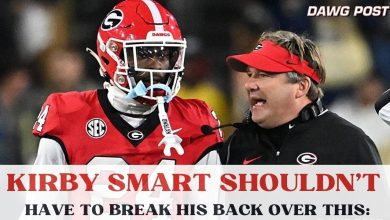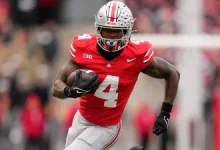The football coach for the Tennessee Volunteers explains why he hasn’t joined the GM craze.

In recent years, the landscape of college football has seen a significant shift. College football programs have become more business-like, with coaches increasingly taking on roles that were once traditionally handled by general managers (GMs) and front-office staff. With programs ramping up their recruitment efforts, handling multimillion-dollar sponsorships, and juggling increasingly complex NIL (Name, Image, and Likeness) deals, the expectations placed on head coaches have reached new heights.
However, amidst this frenzy of head coaches doubling as recruiters, talent evaluators, and program managers, one prominent figure in college football has stood apart: the head coach of the Tennessee Volunteers, Josh Heupel. While many of his peers across the nation have embraced the general manager (GM) role in addition to their coaching responsibilities, Heupel has deliberately chosen to stay away from this trend, focusing on his core responsibility: coaching and developing players. In a recent interview, Heupel explained his stance, shedding light on why he believes the role of a college football head coach should remain centered around football, rather than becoming a catch-all manager for all aspects of a football program.
The Rise of the GM Role in College Football
Before diving into Heupel’s reasoning, it’s important to understand the context in which the GM role has emerged within college football. Over the past decade, college football has evolved from being primarily a game focused on Xs and Os to a highly commercialized industry. College football programs have been compared to professional sports organizations, not just in terms of their competitive nature, but also in terms of their financial scale and organizational complexity.
With the growth of NIL deals, social media influences, and ever-expanding recruitment strategies, the demands on college football coaches have intensified. Coaches are now expected to manage player development, recruit top talent, handle administrative and operational duties, and maintain relationships with boosters, alumni, and the broader fan base. As a result, some head coaches have taken on the role of a GM, juggling both the responsibilities of managing the team on the field and overseeing the business aspects of the program off the field.
Programs like Alabama, Clemson, and Ohio State have employed individuals in GM-like positions, or have empowered head coaches to make front-office decisions, from recruiting to player acquisitions. This allows schools to run their operations with the precision of a professional sports organization. The emergence of these GM-like roles is often seen as a response to the increasingly complex environment surrounding college football—one that demands coaches to wear multiple hats.
However, Josh Heupel has chosen to take a different path. While others may embrace the title of GM and delve deep into player recruitment, financial negotiations, and personnel management, Heupel has kept his focus on one thing: coaching football.
Josh Heupel’s Philosophy: “Football Comes First”
For Heupel, the reasoning behind not embracing the GM craze is rooted in his fundamental belief that the success of a football program lies in the on-field development of players and the quality of the coaching staff. Heupel is known for his offensive genius, having earned a reputation as one of the most innovative offensive minds in college football. Under his leadership, Tennessee has seen a marked improvement, particularly on offense, with Heupel’s fast-paced, high-scoring system making the Volunteers one of the most exciting teams in the nation.
Heupel has consistently emphasized that his priority is player development. “I didn’t get into coaching to run a business, and I didn’t come to Tennessee to build a brand,” Heupel explained. “I came here to coach football, to help young men become better players and better people. If I do that, everything else will fall into place.”
This philosophy has made Heupel somewhat of an outlier in the current era of college football, where coaches are often expected to function as CEOs of their programs, overseeing everything from recruitment pipelines to NIL deals. Heupel has deliberately resisted the trend of becoming consumed by the off-field aspects of the program, choosing instead to concentrate on what he knows best: coaching football.
“I want to have an impact on my players’ lives through football,” Heupel continued. “The relationships, the growth, the development that takes place on the field is what drives me. I’m not in this business to negotiate NIL contracts or to manage a recruiting office. My role is to develop talent on the field, and that’s where I believe I can have the greatest impact.”
The Pressure of Multi-Tasking: The Risk of Losing Focus
In explaining why he hasn’t joined the GM craze, Heupel has been candid about the risks of spreading oneself too thin. With the increase in responsibilities for college football head coaches—especially in light of NIL and the transfer portal—there is a danger of losing focus on the primary task at hand: coaching and winning football games. Heupel has made it clear that he does not want to be distracted by the growing commercial pressures surrounding the program. His decision to remain focused on coaching is both a conscious choice and a strategy designed to keep the team’s objectives clear.
“I’ve seen it in other places,” Heupel remarked. “When coaches start getting too involved in all the business side of things, it can take away from what matters most—the players and the development of the team. When a coach starts managing every little detail of recruiting or NIL deals, they run the risk of losing sight of their most important job: getting the best out of the players they have on the field.”
While some may argue that wearing multiple hats in today’s college football landscape is necessary for success, Heupel is resolute in his belief that delegating certain responsibilities is the key to ensuring the success of the program as a whole. He stresses the importance of creating a strong support staff and empowering assistants to handle the non-coaching aspects of the program.
“I trust my assistants, and I trust the people we’ve brought in to handle the recruiting, the NIL, and the operational side of things,” Heupel said. “My job is to ensure that once the players are on the field, they’re prepared to execute the game plan and improve every day.”
Building a Strong Support System
Part of Heupel’s strategy involves surrounding himself with a strong support staff, including experienced recruiters, operations personnel, and a talented roster of assistant coaches. By delegating the non-coaching tasks to trusted individuals, Heupel can focus on developing his players and preparing the team for success on the field. For Heupel, building a culture where everyone has a defined role is key to achieving success.
“I have full faith in my staff,” Heupel said. “I’ve made sure that we have people in place who can handle the complexities of recruitment, NIL, and the other off-field issues. My job is to make sure we have the right systems in place, and then allow my coaches to coach. Together, we’ve built an environment where everyone can focus on their strengths.”
Heupel’s approach to delegating responsibilities shows a level of trust in his staff and a clear understanding of the importance of specialization. While some coaches might take on additional roles to maximize their influence, Heupel recognizes that success comes from focusing on one thing and doing it well. For him, that means focusing on coaching football and ensuring that his players are receiving the best possible instruction, guidance, and leadership.
The Future of College Football Coaching
Heupel’s approach raises questions about the future of college football coaching. As the business side of college sports continues to grow, will the role of the head coach evolve further to include more managerial duties? Or will Heupel’s philosophy of delegating responsibilities become the new standard for success in the game?
Many experts argue that Heupel’s approach could be the future of college coaching. With NIL, the transfer portal, and social media becoming dominant forces in the sport, the need for specialized staff members who can handle these complex issues is growing. Heupel’s decision to focus on what he does best—coaching—could serve as a blueprint for other programs looking to strike a balance between football and the increasingly commercialized aspects of college sports.
Moreover, Heupel’s success at Tennessee, which has been marked by improvements in team performance and player development, suggests that a coach can still thrive without taking on the GM role. By focusing on what truly matters—winning games and developing players—Heupel has proven that it’s possible to find success while remaining grounded in the core principles of coaching.
Josh Heupel’s decision to stay away from the GM craze is a refreshing reminder of the importance of focus and specialization in the fast-changing world of college football. While other coaches may juggle the responsibilities of talent evaluation, recruiting, and managing NIL deals, Heupel has chosen to place his faith in his support staff, trusting them to handle the business side of things while he remains focused on the field.
In a time when coaches are under pressure to wear multiple hats, Heupel’s approach offers a unique perspective. By concentrating on coaching and player development, Heupel has demonstrated that it is possible to build a successful program without succumbing to the pressures of multi-tasking. The Volunteers’ ascent under his leadership speaks volumes about the effectiveness of this approach, and it will be interesting to see whether other coaches in college football adopt a similar strategy in the years to come.
For now, Heupel is content with his role as a coach, developing the next generation of football players and focusing on what truly matters: the game. While the GM craze may be sweeping through college football, the head coach of the Tennessee Volunteers has chosen to stand apart—and in doing so, he may just have found the winning formula for success.









